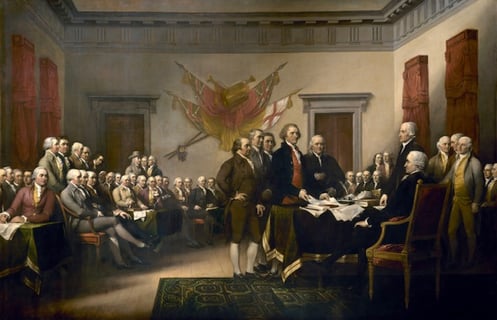The Constitution and Freedom of Speech: Safeguarding Liberty
The United States Constitution, a beacon of liberty and limited government, holds freedom of speech in high regard. Enshrined in the First Amendment, this cherished right isn't just a legal provision; it's a linchpin of American diplomacy. This article gets into the origins of freedom of speech, its pivotal role in the American constitutional framework, and the complex issues surrounding its interpretation and application.
Casey Adams
10/3/20233 min read


Introduction
Freedom of speech is the bedrock of a free society.
Enshrined in the First Amendment of the U.S. Constitution, it ensures that individuals have the right to express their opinions without fear of government suppression.
The Founding Fathers recognized that without free speech, tyranny could take hold, silencing opposition and subjugating the people.
Throughout history, freedom of speech has served as the primary safeguard against authoritarianism, enabling the public to challenge injustice, advocate for change, and hold those in power accountable.
Historical Foundations
The importance of free speech was deeply ingrained in the American colonial experience.
Before the American Revolution, British authorities sought to suppress dissenting voices that criticized the monarchy and its policies.
The Stamp Act of 1765 and the Townshend Acts of 1767 imposed burdensome taxes on the colonies without their direct representation in Parliament, leading to the rallying cry:
"No taxation without representation!"
This slogan exemplified the people's demand for a voice in their governance, a fundamental aspect of free speech.
Colonial leaders such as Samuel Adams, Thomas Paine, and Patrick Henry used speech and written publications to spread revolutionary ideas, rally support against British rule, and inspire resistance.
Paine’s pamphlet Common Sense (1776) was a prime example of how free expression could mobilize public opinion toward independence.
The ability to openly criticize government policies played a crucial role in securing American independence.
The First Amendment and Its Protection of Speech
When the U.S. Constitution was drafted in 1787, many citizens feared that the new federal government might become too powerful and infringe upon individual liberties.
In response, the Bill of Rights was added in 1791, with the First Amendment explicitly stating:
"Congress shall make no law... abridging the freedom of speech, or of the press."
This provision ensured that Americans would always have the ability to express their thoughts, criticize the government, and advocate for change without fear of punishment or censorship.
The Founding Fathers knew that any government left unchecked could gradually erode liberties, and free speech was the most effective tool against potential tyranny.
The Role of Free Speech in Preventing Tyranny
Tyrannical regimes throughout history have sought to silence dissent to maintain control.
From the suppression of free speech under monarchies to the censorship imposed by totalitarian governments in the 20th century, history demonstrates that without the ability to speak freely, people become powerless.
The Founders sought to prevent such a fate by making free speech a guaranteed right in the new republic.
By protecting speech, the First Amendment ensures that citizens can:
Criticize the government without fear of imprisonment or retaliation.
Expose corruption and misconduct by those in positions of power.
Participate in political discourse, allowing for diverse viewpoints and informed decision-making.
Advocate for social change, from civil rights movements to workers' rights and beyond.
The Limits and Responsibilities of Free Speech
While the First Amendment provides broad protections, free speech is not absolute.
The government may impose restrictions on speech that incites violence, constitutes defamation, or creates a direct threat to public safety (such as shouting “fire” in a crowded theater without cause).
Additionally, private entities, such as social media platforms, are not bound by the First Amendment and can regulate speech on their platforms as they see fit.
Nonetheless, the responsibility of maintaining a culture of free speech extends beyond legal protections.
A healthy democracy thrives when people are willing to engage in open discussions, respect differing opinions, and counter misinformation with facts rather than censorship.
Conclusion
The First Amendment’s protection of freedom of speech is one of the most critical elements of American democracy.
It safeguards the people’s right to speak out against injustice, hold their leaders accountable, and advocate for progress.
Without free speech, tyranny could take root, and citizens would lose their ability to resist oppression. The Founding Fathers understood this, which is why they enshrined this right at the very foundation of the nation’s legal framework.
As long as free speech is defended and upheld, the principles of liberty will endure.
Freedom of Speech



